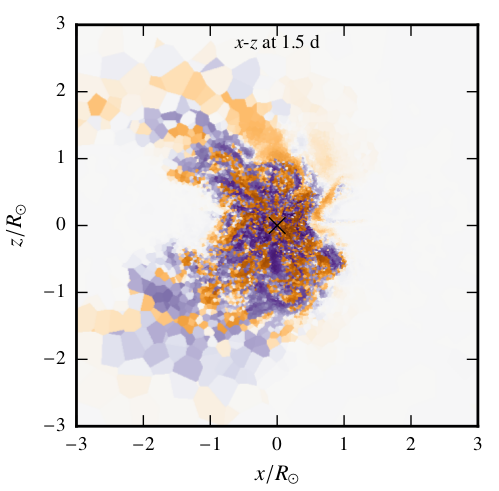First simulation of binary stars in the common envelope phase including magnetic fields

During the common envelope (CE) phase, a giant star in a binary system overflows its Roche lobe and unstable mass transfer leads to a spiral-in of the companion, resulting in a close binary system or in a merger of the stellar cores. Dynamo processes during the CE phase have been proposed as a mechanism to generate magnetic fields that are important for forming magnetic white dwarfs (MWDs) and for shaping planetary nebulae. Here, we present the first magnetohydrodynamics simulations of the dynamical spiral-in during a CE phase. We find that magnetic fields are strongly amplified in the accretion stream around the 1 solar mass companion as it spirals into the envelope of a 2 solar mass RG. This leads to field strengths of 10 to 100 kG throughout the envelope after 120 d. The magnetic field amplification is consistent with being driven by the magnetorotational instability. The field strengths reached in our simulation make the magnetic field interesting for diagnostic purposes, but they are dynamically irrelevant. They are also too small to explain the formation of the highest fields found in MWDs, but may be relevant for luminous red novae, and detecting magnetic fields in these events would support the scenario as proposed here.
Ohlmann, S. T., Röpke, F. K., Pakmor, R., Springel, V., & Müller, E. (2016):
Magnetic Field Amplification During the Common Envelope Phase,
Monthly Notices of the Royal Astronomical Society, 462, L121, [ADS]
Über das HITS
Das HITS (Heidelberger Institut für Theoretische Studien) wurde 2010 von dem Physiker und SAP-Mitbegründer Klaus Tschira (1940-2015) und der Klaus Tschira Stiftung als privates, gemeinnütziges Forschungsinstitut gegründet. Es betreibt Grundlagenforschung in den Naturwissenschaften, der Mathematik und der Informatik. Zu den Hauptforschungsrichtungen zählen komplexe Simulationen auf verschiedenen Skalen, Datenwissenschaft und -analyse sowie die Entwicklung rechnergestützter Tools für die Forschung. Die Anwendungsfelder reichen von der Molekularbiologie bis zur Astrophysik. Ein wesentliches Merkmal des Instituts ist die Interdisziplinarität, die in zahlreichen gruppen- und disziplinübergreifenden Projekten umgesetzt wird. Die Grundfinanzierung des HITS wird von der Klaus Tschira Stiftung bereitgestellt.